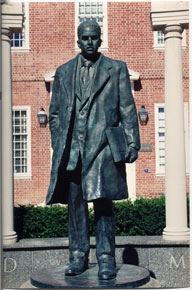Thurgood Marshall Memorial on the State House Grounds
Career Chronology |
Text Around the Circle
 Thurgood Marshall memorial by Antonio Tobias Mendez. Lawyers'
Mall/State House Square.: Lawyer's
Mall/State House Square. Unveiled in
1996, this memorial honors the great
civil rights leader who became the first
African-American to serve on the U.S.
Supreme Court. The memorial is erected
on the site of the old Court of Appeals
building where Marshall argued some of
his early civil rights cases.
Thurgood Marshall memorial by Antonio Tobias Mendez. Lawyers'
Mall/State House Square.: Lawyer's
Mall/State House Square. Unveiled in
1996, this memorial honors the great
civil rights leader who became the first
African-American to serve on the U.S.
Supreme Court. The memorial is erected
on the site of the old Court of Appeals
building where Marshall argued some of
his early civil rights cases.
Thurgood Marshall was one of this century's foremost leaders in the
struggle for equal rights under the law. A native of Baltimore, Marshall graduated
from Frederick Douglass High School in Baltimore and Lincoln University in
Pennsylvania. He earned his law degree from Howard University in Washington,
D.C. where he first met the great civil rights lawyer Charles Houston. After earning
his law degree, Marshall returned to Baltimore and began his long association
with the NAACP. In 1967, Marshall became the first African American to be
appointed to the U.S. Supreme Court.
Following Marshall's death in 1993, the state of Maryland decided to honor the
great civil rights leader and jurist with a memorial at the State House in Annapolis.
On May 17, 1994, exactly 40 years after the Supreme Court's Brown v.
The Board of Education of Topeka decision, the governor of Maryland signed an
Executive Order establishing the Thurgood Marshall Memorial Statue Commission.
After a nationwide competition, the Commission awarded the design of the
memorial to Maryland artist Toby Mendez.
In 2005, BWI Airport was renamed Baltimore/Washington International Thurgood
Marshall Airport, as part of House Bill 189 signed into law by Governor
Robert L. Ehrlich, Jr. In June 2006, the Thurgood Marshall Tribute, an exhibit
about the life of Thurgood Marshall, was opened to the public in Terminal C of
the airport. The tribute features a bust of Marshall by Toby Mendez, adapted
from the original full-length statue in the Thurgood Marshall Memorial in Annapolis.
Chronology of Thurgood Marshall's Career
- 1925: Graduated from Frederick Douglass Senior High School, Baltimore, MD
- 1930: Graduated with honors from Lincoln University, PA
- 1933: Graduated from Howard University School of Law, Washington, DC
- 1933-38: Initiated civil rights work in Maryland against lynching and for equal pay for teachers
- 1934: Begins work for the Baltimore Branch of the National Association for the Advancement of Colored People
- 1936: Won Board of Regents of the University of Maryland v. Donald Murray
- 1940: Appointed Director-Counsel of NAACP Legal Defense and Educational Fund
- 1954: Brown et. al. v. Board of Education of Topeka et. al.
- 1961-65: Served as Judge of the Second Circuit Court of Appeals appointed by President John F. Kennedy
- 1965-67: Served as United States Solicitor General appointed by President Lyndon B. Johnson
- 1967-91: Served as first African American Justice of the United States Supreme Court appointed by President Lyndon B. Johnson
Text Around the Circle
Thurgood Marshall's first major victory in his life-long struggle for equality under
the law for all Americans took place in the Maryland Court of Appeals which
then stood near this memorial. In 1935, Marshall successfully argued for the
admission of Donald Murray to the University of Maryland School of Law. This
was the first step on the road to Brown v. the Board of Education of Topeka
in which the United States Supreme Court in 1954 overturned the doctrine of
"separate but equal" established by Plessy v. Ferguson (1896). Throughout his
life, Thurgood Marshall fought to fulfill the promise held within the quote above
the entrance to the United States Supreme Court building in Washington, D.C.
"Equal Justice Under Law."
Back to Memorials
Fact Sheet
Oversight Committee:The Governor's Commission on the Thurgood Marshall Memorial
Artist: Antonio Tobias Mendez
Landscaping: James R. Urban, Urban & Associates
Engineering: Charles Emory, Jr., Structural Engineer
Contractor: Pagliaro Brothers, Inc.
Dedication: October 22, 1996
Maryland state agencies:
• Division of Historical and Cultural Programs of the Department of Housing and Community Development
• The Maryland State Archives
• The Department of General Services